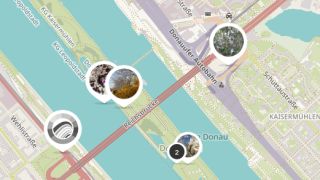Online recording of nature sightings on the Danube Island

Naturkalender-Karte (German)
Do you enjoy nature watching on the Danube Island and observing how it changes with the passing seasons? Contribute to the project by logging your animal and plant sightings and photos in the nature calendar of the Central Institute for Meteorology and Geodynamics (ZAMG). By doing so you'll be providing valuable data to support research into the local climate and seasons in the context of climate change.
Under the auspices of the EU LIFE DICCA project, the City of Vienna and the ZAMG are working together to study climate change on the Danube Island by observing the plants that grow there.
Why not join in!
All interested members of the public are invited to join in. The more people log and share their nature sightings, the better the data available for scientific study and analysis.
- Log in to the Nature's Calendar website or
- Download the free App "Nature's Calendar ZAMG" app:
Once you've registered you can:
- Upload photos of animals and plants
- Interact with other users and comment on their sightings
- Contact the team from the Municipal Department for Water Management (MA 45) and the ZAMG
What kind of sightings are we looking for?
We basically welcome all sightings logged in the nature calendar. However, records of the so-called phenological indicator plants are especially important for our research. These indicator plants and their respective phases of development are listed in the nature calendar.
For instance, scientists want to know when apple or pear trees come into blossom or when elderberries are ripe. Long-term observations of the same plant communities over time are of particular interest.
What is phenology and why is it important?
Phenology is the study of how weather and climate affect the seasonal life cycles of plants and animals. This field of study uses plants as highly sensitive instruments for measuring the near-ground atmosphere. Plants are reacting to the rising temperatures of recent years by flowering or fruiting increasingly early.
A citizen science project by the ZAMG
The practice of involving members of the public in scientific research is known as citizen science. Online platforms that encourage nature lovers to record and share their sightings are a valuable source of data for wildlife and climate research.
The ZAMG has been running its phenological observation network since 1851, which probably makes it Austria's oldest citizen science project. The project has now been brought up to date with a new tool, the "Nature's Calendar ZAMG" app.
Data logged in the nature calendar are entered directly into the ZAMG phenological observation network as well as the Pan-European Phenological Database, where they are also available for use by other research and education initiatives.
City of Vienna | Water Management
Any questions, requests, or concerns? Please contact the City Service at contact form

